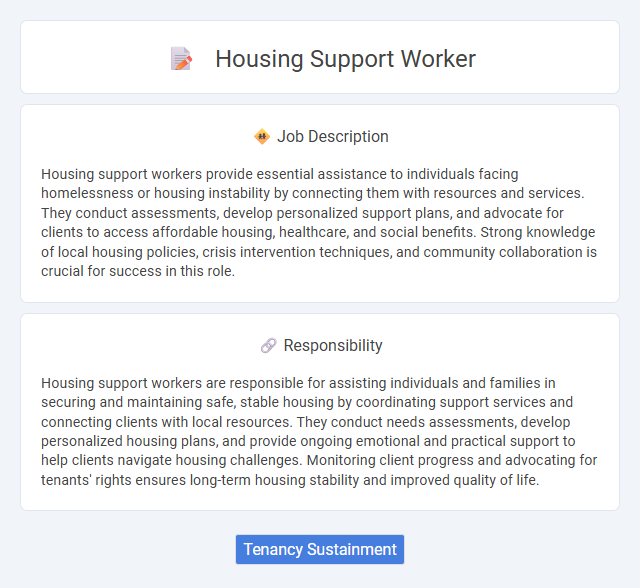
Housing support workers provide essential assistance to individuals facing homelessness or housing instability by connecting them with resources and services. They conduct assessments, develop personalized support plans, and advocate for clients to access affordable housing, healthcare, and social benefits. Strong knowledge of local housing policies, crisis intervention techniques, and community collaboration is crucial for success in this role.
Housing support workers are likely well-suited for individuals with strong empathy, patience, and problem-solving skills, as the role often involves assisting people facing housing instability, mental health challenges, or financial hardship. Those who can maintain composure in stressful situations and communicate effectively may find this job rewarding and manageable. Conversely, individuals who struggle with emotional resilience or lack a service-oriented mindset might find the demands of this position challenging.
Qualification
Housing support workers typically require a background in social work, psychology, or a related field, often holding a diploma or degree in human services. Essential qualifications include knowledge of local housing policies, strong communication skills, and training in crisis intervention and case management. Certification in first aid and experience working with vulnerable populations further enhance employability in this role.
Responsibility
Housing support workers are responsible for assisting individuals and families in securing and maintaining safe, stable housing by coordinating support services and connecting clients with local resources. They conduct needs assessments, develop personalized housing plans, and provide ongoing emotional and practical support to help clients navigate housing challenges. Monitoring client progress and advocating for tenants' rights ensures long-term housing stability and improved quality of life.
Benefit
Housing support workers likely provide essential assistance to individuals facing housing instability, increasing the chances of securing safe and stable living conditions. Their role may improve clients' access to resources, such as financial aid and counseling, reducing the risk of homelessness. Support workers probably enhance community well-being by fostering long-term housing solutions and promoting independence.
Challenge
Housing support worker roles likely involve managing complex cases with clients facing unstable living conditions, which can be emotionally demanding. The probability of encountering difficult situations, such as homelessness or mental health crises, requires resilience and effective communication skills. Workers may often need to balance limited resources while striving to provide consistent support and advocacy.
Career Advancement
Housing support workers gain valuable experience in case management, tenant advocacy, and resource coordination, building a strong foundation for career growth. Opportunities for advancement often include supervisory roles, program management, and specialized positions in social services or mental health support. Pursuing certifications in counseling or social work can further enhance career prospects and increase earning potential in the housing support sector.
Key Terms
Tenancy Sustainment
Housing support workers specializing in tenancy sustainment play a crucial role in preventing homelessness by helping tenants maintain stable housing through advocacy, budgeting advice, and liaison with landlords. These professionals assess tenant needs, mediate disputes, and connect individuals with community resources to ensure long-term tenancy success. Effective tenancy sustainment reduces eviction rates and promotes housing security for vulnerable populations.
 kuljobs.com
kuljobs.com